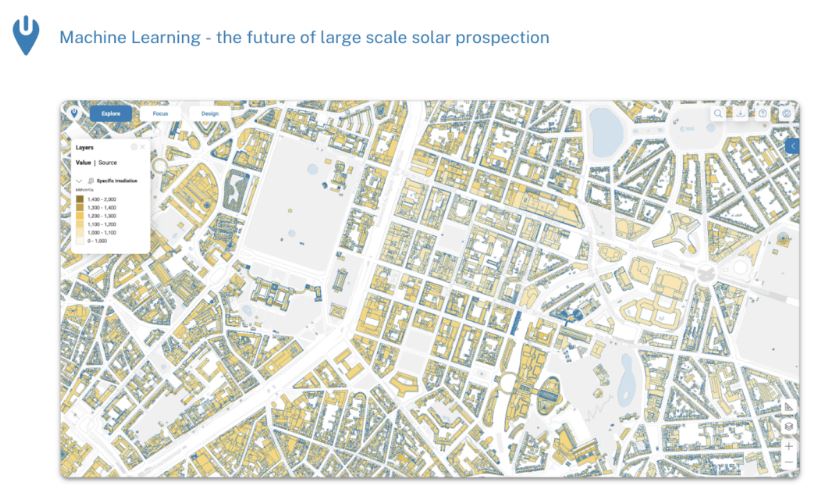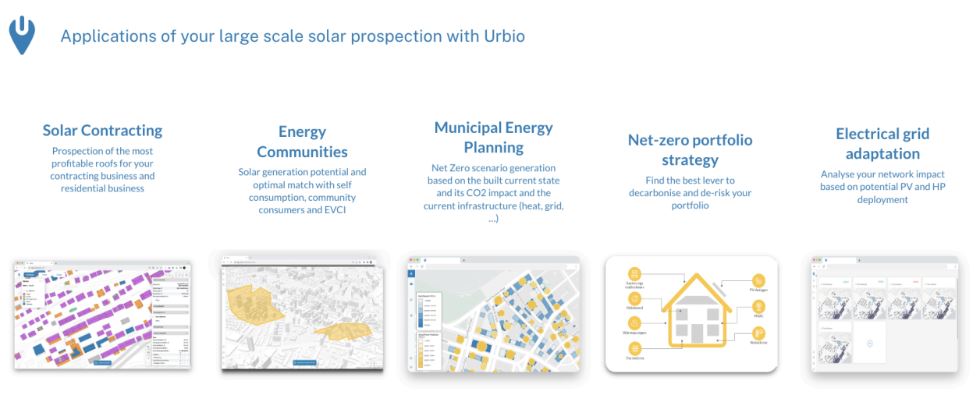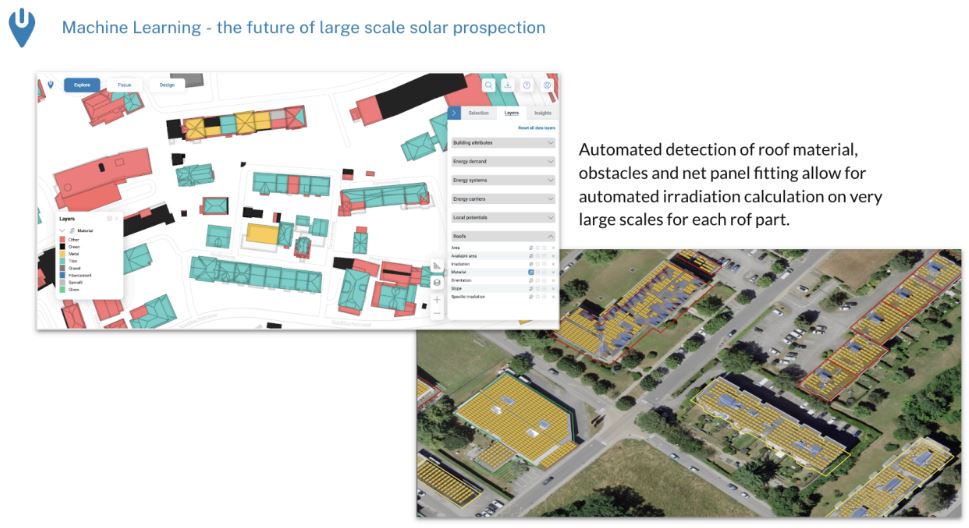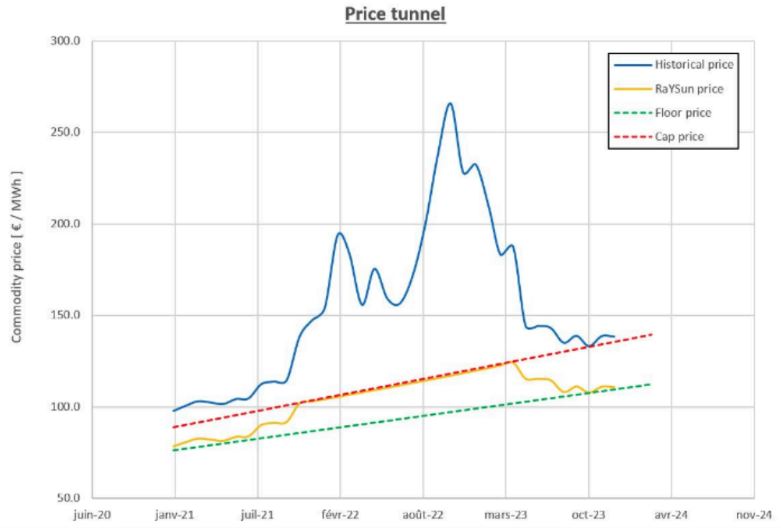RaySun and Urbio: Grid impact of large-scale deployment of Decentralised Energy Systems (DES)
This initiative focuses on the challenges posed by large-scale decarbonization projects and their effects on the power grid, primarily due to the proliferation of Decentralized Energy Systems (DES). Although these systems are crucial for meeting decarbonization objectives, they introduce issues related to grid stability and capacity, especially during peak demand and production periods. The study emphasizes the importance of strategic investment and planning. The goal is to align the deployment of DES with the current capabilities of the electrical grid, aiming to enhance both financial and operational efficiencies.


Within this context, RaYSun employs the AI-powered capabilities of the Urbio platform to expedite the process of identifying the most economically viable energy communities. This approach is not just about accelerating the transition towards renewable energy but also ensuring that it is done in a way that maintains grid reliability and optimizes resource allocation.
For a regional Distribution System Operator (DSO) like Ores, responsible for the vast majority of electricity distribution in Walloon, manages the delivery of 25 million MWh of electricity annually through a network spanning 52,522 km of cable. By leveraging Urbio's advanced AI technology, RaYSun is able to quickly pinpoint those communities that stand to benefit most from decarbonization initiatives. This strategic partnership underscores the critical role of innovative technologies in facilitating a smoother transition to renewable energy sources, ensuring that the expansion of DES across regions like Walloon is both sustainable and aligned with existing grid infrastructure.
Digitalisation Solution or Approach: Urbio's AI-driven platform swiftly pinpoints the optimal pairing of decarbonized electricity producers and consumers within any given community, ensuring the most relevant matches based on specific criteria. This approach significantly mitigates the impact on the grid, particularly when solar panels are installed on a large scale. By intelligently coordinating the distribution of renewable energy within localized networks, Urbio facilitates a more balanced and efficient energy flow, reducing potential strains on the grid infrastructure and enhancing overall sustainability in energy consumption.
Objectives: The primary aim is to fast-track the setup of decarbonized electricity generation locations, thereby fulfilling CO2 reduction objectives while optimizing prosumer profits.
Context, Challenges, and Framework
Industry Landscape: The drive for decarbonization has led to a significant increase in decentralized energy resources (DERs), including solar panels, wind turbines, and energy storage systems. These resources are integral to reducing carbon footprints but introduce complexity into the energy distribution system traditionally designed for unidirectional flow from centralized power plants.
The integration of renewable energy sources has been accelerated by technological advancements and policy support. However, the variability and decentralized nature of these sources pose grid management challenges, requiring DSOs to innovate and adapt to maintain grid stability, reliability, and efficiency.
Key Challenges for DSOs
- Grid Stability and Capacity Management: The intermittent nature of renewable energy sources, like solar and wind, can lead to fluctuations in power supply, challenging the grid's stability. DSOs must manage these variations to ensure a constant and reliable energy supply.
- Investment in Infrastructure: The shift towards a more decentralized and digitalized grid necessitates significant investments in infrastructure upgrades and smart technologies. This includes advanced metering infrastructure, grid automation,and energy storage solutions to enhance flexibility and resilience.
- Regulatory and Market Changes: DSOs operate within a regulatory environment that is evolving to accommodate the energy transition. Navigating these changes, including tariff structures, incentives for renewable energy, and policies promoting energy efficiency, is crucial for DSOs.
- Customer Engagement and Demand Response: With the rise of prosumers—consumers who also produce energy—DSOs need to foster engagement and develop demand response programs that encourage energy-saving behaviours and the optimal use of renewable energy.
Roadmap: Where in Accenture’s framework for digitising DSO activities can the digitalisation initiative be situated?
- DSO Activity: build. Urbio and RaYSun allow DSO to anticipate and reduce the impact on the grid of DES deployments.
- Digital Maturity Level: Leading
- Asset: Data Factory, Digital Twin, Generative AI
Specific Challenges Addressed: The digitalization initiative by DSOs like Ores is strategically designed to tackle the multifaceted challenges of managing an evolving energy grid. These challenges encompass the maintenance of aging infrastructure, accommodating the expansion and complexity introduced by decentralized energy resources, and handling fluctuating energy demands driven by the rise of electric vehicles and the electrification of heating systems.
Additionally, the initiative addresses the imperative of bolstering cybersecurity to protect the increasingly digital and interconnected grid infrastructure. It also focuses on ensuring compliance with dynamic regulatory requirements and enhancing consumer engagement, particularly with the growing segment of prosumers. By integrating advanced technologies such as AI, IoT, and big data analytics, the initiative aims to optimize grid operations, streamline regulatory compliance, and facilitate a more sustainable and efficient energy ecosystem.
Solution Overview
Technological Definition:
Urbio is a platform used to assess current state of building’s energy profiles on a very large scale and design multiple decarbonisation scenarios combining solar, heat (HP, DHN), and refurbishing. The platform stands on three key components: Urbio’s DataFactory, Urbio’s Digital Twin and Urbio’s patented Generative Design. The three pillars are powered by AI that augments the buildings energy profile’s precision on a large scale and sophisticated optimisation algorithms.
Urbio’s clients say Urbio allows to do in minutes and more precisely what used to take days with approximate assessment.


Solution Description:
Urbio’s platform covers the whole project life cycle, including data and models governance, digital twin and generative design.
The combination of Urbio and RaySun’s expertise in financial planning, funding, deployment and operation of User Communities, allow to proactively identify the most relevant and profitable energy communities and provide the stakeholders (prosumers and consumers) with a sound business model at light speed. From there, RaYSun will drive the whole project funding, deployment and operate the community all the way including invoicing.
Technological Components:
- Urbio’s data factory, Digital Twin, Generative Design and reporting
- RaySun’s financial planner.
Implementation Details
Phases:
- Development of Energies Community (ECs): Focuses on operational development, community setup, and management across seven distinct ECs, each with specific timelines for technical installation, community legal setup, and operational activities.
- Digital Tool Development: Scheduled to start in September 2024, aiming to enhance the project's digital infrastructure over 36 months, supporting administrative, legal, and operational management of ECs.
- Pilot programs, evident in the implementation and testing of digital tools, alongside the iterative development and deployment of ECs, highlight a structured approach to gradual rollout and optimization.
Stakeholders:
- Urbio, RaYSun and Partners/Subcontractors: Forming the core project team, responsible for overall project execution, digital tool development, and EC setup.
- Local DSOs and Regulatory Bodies: Engage in discussions for EC authorization, ensuring regulatory compliance and grid integration.
- Community Members (Prosumers): Central to the operational phase, participating in energy exchange, influenced by the project’s success in creating viable ECs.
Challenges Encountered:
- Technical Integration: Adapting new digital solutions to diverse EC requirements and ensuring seamless integration with existing grid infrastructures.
- Stakeholder Coordination: Balancing the needs and expectations of multiple stakeholders, including regulatory bodies, DSOs, and community members, for successful project deployment.
- Risk Management: Addressing identified risks, such as economic volatility, participation rates, regulatory uncertainties, and operational hurdles like platform management and asynchronous consumption challenges.
Key Performance Indicators (KPIs)
Efficiency and Reliability Improvements: Metrics related to the improvement of processes, efficiency, and reliability across the DSO’s activities:
- enhanced reliability, greater safety, increased efficiency, reduction of downtime
- increased SAIFI and SAIDI
- time savings, extension of life duration of assets
- cost savings (e.g., optimisation of maintenance strategy, shift from preventive and corrective maintenance to predictive maintenance, etc.)
- other metrics
User Satisfaction:
- Real estate owners and tenants reduce their energy costs significantly
- DSO reduce their need to invest in the grid and mitigate the risk linked to the growing deployment of DES or at least can anticipate where to focus their investments
- Financial institutions and utilities investing in the DES infrastructure generate a healthy revenue stream
Achievements:
- Speed, scalability and compliance: RaYSun’s end-to-end prospection and assessment service powered by Urbio’s AI technology, allows to spot the most relevant and profitable energy communities opportunities across large geographical zones.
- One stop shopping: RaYSun’s value proposition provides an end-to-end comprehensive service to DSO, real estate owners and municipalities to assess, decide, fund, implement, operate with one single point of contact.
- ROI: As the best communities are being identified, the best ROI will be guaranteed to investors and stakeholders thanks to the tunnel price principle


Lessons Learned and Best Practices
Key Takeaways: When DSO collaborate and share data, accuracy increases further reducing iterations and further accelerating the overall deployment of energy communities.
Best Practices: During our implementations, we found that establishing simple, cost-effective procedures, developed collaboratively among suppliers, DSOs, and community managers, significantly enhances the effectiveness and efficiency of digitalization initiatives.
Scalability: Thanks to the Urbio platform, used as a data source foundation across wide geographies in Europe (Belgium, Germany, France, Switzerland today and expanding in the coming months and years) and thanks to the similarity of models across Europe, the identification of the best Energy communities is automated and highly scalable. If on top of the existing models the DSOs collaborate by sharing additional data, the scalability across Europe and the speed of energy communities deployment will be a great success.
Conclusion
Summary: Energy transition and the integration of renewable energy into the electrical grid pose significant challenges. However, with wise investments and innovative solutions like smart energy sharing, we can overcome these challenges to build a more sustainable and resilient energy future.
Actionable Insights: For DSOs eyeing digitalization, a strategic approach is key: Begin with a comprehensive assessment to pinpoint where digital enhancements can yield the greatest impact.
Embrace scalable and secure technological solutions, ensuring they can adapt to future energy trends while safeguarding data. Cultivate an innovative culture, encouraging staff to leverage new tools effectively. Initiate pilot projects to fine-tune technologies before full deployment. Measure success through clear KPIs, and stay agile, ready to evolve with technological advancements and industry shifts.
“Urbio easily replaces 5 days of work by 5 minutes.”
- Philippe Corboz, Smart City Project Manager, Romande Energie
“I was rarely able to quantify market potentials in under 10 days. Now Urbio allows me to do it in minutes, with more precision!”
- Solar Contracting Product Manager, Swiss energy provider
Website and links
Urbio’s platform powered by AI - demo for end-to-end decarbonisation project on a large scale
Social Media: URBIO on LinkedIn RaYSun on LinkedIn